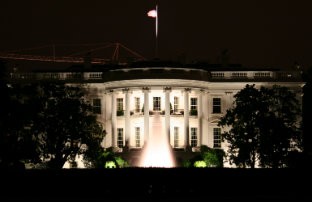Christian conviction in the age of Trump
Practice the beatitudes. Speak truth to power. Do justice, love kindness, and walk humbly with God.

I have never conducted a survey of individual political preferences within my congregation. Yet after years of knowing these people, I believe that a 55/45 Democrat/Republican party split is a pretty accurate estimate. Many of my good friends told me they were eager to vote for Donald Trump, although they didn’t gain that enthusiasm from me. The gospel we preach has zero tolerance for bigoted speech or contempt for the weak, and no taste for vile conspiracy theories that promote fear. Xenophobic sympathies have no place either.
The morning after Trump’s victory, church members began calling and emailing me for my reaction to the election. Could Trump realistically be the president of all the people whose fundamental human worth he has regularly insulted? Yes, that was possible, I suggested. I trust the conviction that hope consists of things unseen. I recognize that faith calls us to pray for reconciliation. But still, they persisted, could this man with a disordered personality, known for vindictiveness and a lack of empathy, not to mention an obsession with conquest and domination—could he be a president for all peoples?
I admitted to some suspicion over Trump’s victory being pegged to people angry at globalization or at Washington’s elite messing with their lives. Surely there are reasons why a broad coalition of white voters were drawn to Trump’s fixation with the birther controversy and his disdain for immigrant and Muslim peoples. Does racism or “celebrated whiteness” still linger as our nation’s original sin?
In The End of White Christian America, Robert P. Jones names the anxieties felt by a majority of white Americans who believe that our nation’s culture and way of life have changed for the worse in the last 60 years. In the minds of many, America’s whiteness is worrisomely slipping away.
When a congregational parent of some biracial kids emailed me the day after the election, I knew it was time for a Christian response to the election of Trump. “It’s a difficult day for Aron and Jordan and their friends of color at middle school,” this parent wrote. “They’re feeling vulnerable and scared today. If you see them at confirmation tonight, I'd appreciate you letting them know that you value them. They could use a little reassurance.”
That’s all I needed to begin assembling some Christian convictions to share with friends appalled by, or thrilled with, Trump’s victory. Practice the beatitudes of Jesus and you’ll never be tempted to bully. Speak truth to power. Do justice, love kindness, and walk humbly with God. Weak and vulnerable people need our embrace, not our mockery. Let’s welcome the stranger, build bridges of hospitality, and cherish grace. Remember that once you speak a word, it’s impossible to unspeak it. Resist fear. Insist on extending hope to others. Never view yourself as above forgiveness.
Were our new president to request a personal copy of these admonitions, I’d include one more: “Mr. Trump,” I’d write, “Please look for a new Bible verse to serve as your favorite. ‘An eye for an eye’ just doesn’t cut it. Did you know that Jesus’ whole life was a repudiation of vengeance? Well, the good news is that yours can be too.”




